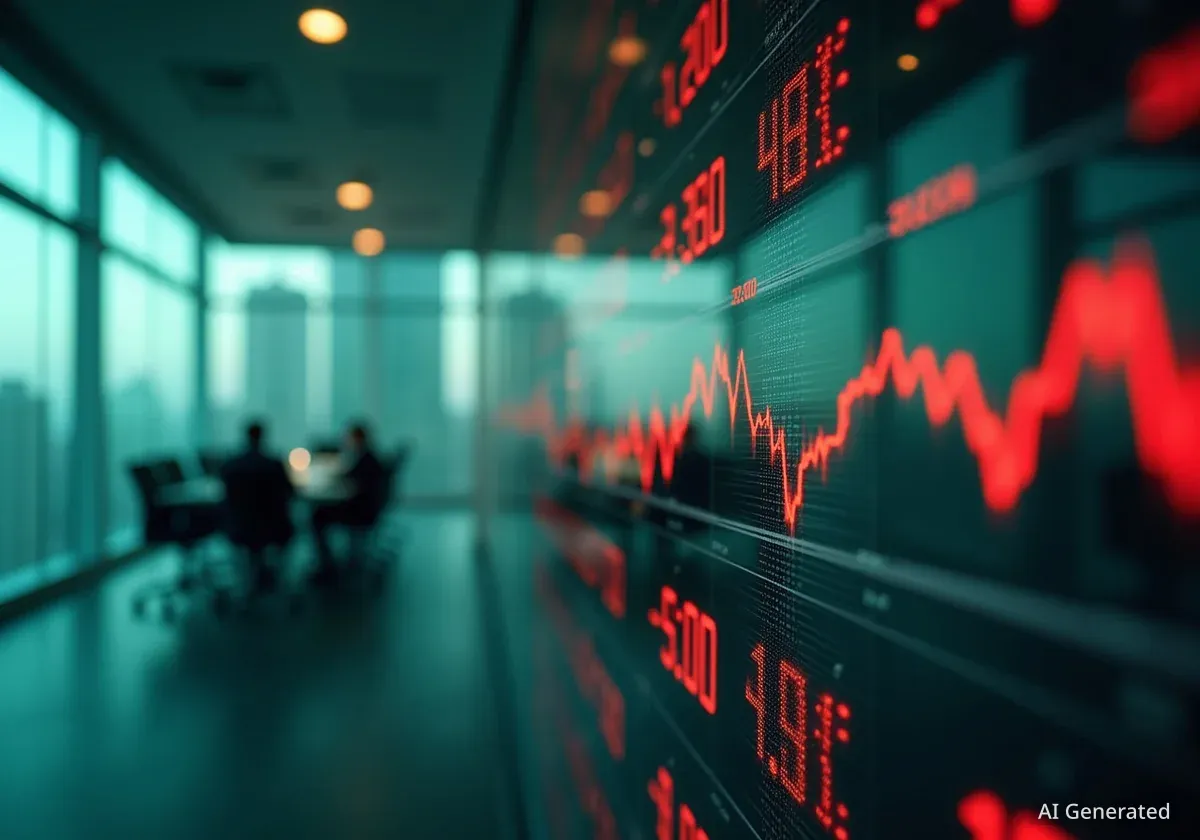Financial markets navigated a complex landscape of conflicting economic signals on Friday, with optimistic forecasts from technology giant Intel and automotive newcomer Scout Motors balanced against cautious commentary on Federal Reserve policy and the broader economic trajectory. Analysts offered divergent views on market health, corporate growth, and the potential for future interest rate adjustments.
Key Takeaways
- Intel's leadership projected the start of a 'next glory phase,' signaling strong confidence in the company's future.
- Moderna announced a strategic focus on new vaccine development, including potential cancer treatments, as part of its revenue strategy.
- Scout Motors highlighted its commitment to job creation and domestic manufacturing to 'meet the American moment.'
- Analysts debated the Federal Reserve's next move, with some suggesting a 25-basis-point rate cut is the most likely scenario.
- Commentators like Steve Hilton and Larry Kudlow provided contrasting assessments of the overall health of the U.S. economy.
Technology Sector Presents a Divided Picture
The technology industry offered both promising long-term outlooks and immediate challenges. A chief investment officer expressed strong confidence in Intel, stating that the company is at the beginning of its 'next glory phase.' This sentiment points to a belief in the semiconductor firm's strategic direction and future growth potential.
However, the hardware sector also faced headwinds. A live demonstration of Mark Zuckerberg’s new AI-powered glasses at a major Meta event reportedly failed, highlighting the significant hurdles that remain in bringing advanced consumer technology to market. This incident serves as a reminder of the high-stakes, high-risk nature of tech innovation.
The State of the Tech Industry
The global technology sector is currently navigating rapid advancements in artificial intelligence, intense competition in semiconductor manufacturing, and the challenge of launching new hardware categories. Investor sentiment often shifts based on single product announcements or executive forecasts.
Economic Health and Fed Policy Debated
Perspectives on the U.S. economy's performance varied significantly among financial commentators. Steve Hilton, a political commentator, suggested the economy is not performing as strongly as some believe, questioning why it isn't 'taking off like a rocket ship.'
Adding to this perspective, economist Larry Kudlow asserted that the current administration was handed a 'much worse economy' than was widely understood, suggesting underlying challenges have persisted. These comments contribute to an ongoing debate about the true strength and momentum of economic growth.
Speculation on Interest Rate Adjustments
The Federal Reserve's potential actions on interest rates were a central topic of discussion. Financial analyst Liz Peek commented that any rate cut exceeding 25 basis points would signal that the central bank believes it has been 'too late' in adjusting its policy. This implies that a larger cut would be interpreted as a reactive measure to unforeseen economic weakness rather than a proactive adjustment.
Federal Reserve's Dual Mandate
The Federal Reserve operates under a dual mandate from Congress: to promote maximum employment and stable prices. Its decisions on interest rates are the primary tool used to balance these two objectives, making its meetings closely watched by investors worldwide.
Corporate Strategies and Future Growth
Several major companies outlined their strategic plans, providing insight into key sectors. Moderna's president discussed the company's revenue outlook and its focus on developing new vaccines. Significantly, this includes research and development for cancer treatments, marking a major potential expansion beyond its current portfolio.
"Our focus remains on leveraging our mRNA platform to address significant unmet needs in medicine, from infectious diseases to oncology," a statement reflecting Moderna's forward-looking strategy might have noted.
In the automotive sector, Scout Motors emphasized its role in job creation and economic growth. The company's leadership touted its expansion plans as designed to 'meet the American moment,' aligning its business goals with national economic objectives and the trend toward revitalizing domestic manufacturing.
Market Sentiment and Investor Outlook
The day's collection of news and commentary fueled a dynamic conversation about market direction. Market analyst Charles Payne posed the question of whether the market is currently experiencing a 'melt-up'—a sharp and unexpected rise driven by investor sentiment rather than fundamental improvements.
Meanwhile, a chief equity strategist highlighted a specific, unnamed company as the 'exact one' investors are looking for, suggesting that opportunities for strong returns exist despite the mixed economic picture. This points to a strategy of selective investment in companies with solid fundamentals.
Political Undercurrents
Political events also drew attention from the financial world. A royal commentator described King Charles's welcome for former President Trump as the ‘most spectacular’ in history, an event with potential implications for international relations and trade sentiment. Separately, economist commentary noted surprise that Trump had admitted the United Kingdom received a better outcome in a recent deal, a remark analyzed for its potential impact on future negotiations.
These varied developments underscore a market environment where investors must weigh optimistic corporate forecasts against macroeconomic uncertainty and ongoing political discourse to make informed decisions.





